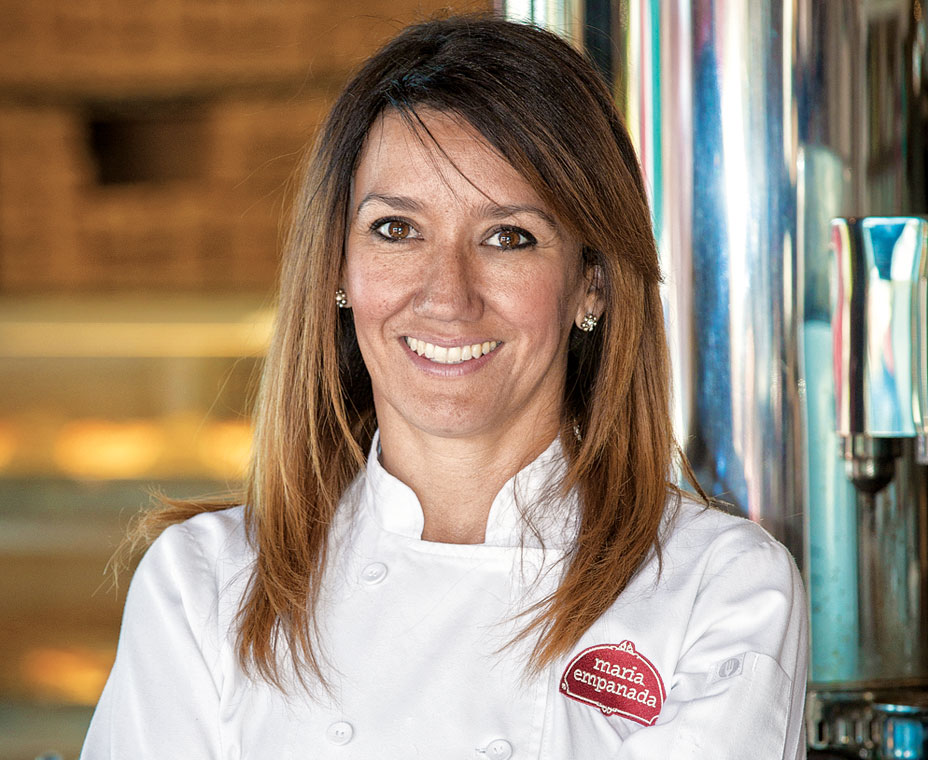Lorena Cantarovici knew her business was scalable from day one.
She started Maria Empanada in Denver with only $4,000 she gathered from friends, family, and her own wallet. Since then, a few bank loans have helped her grow the Argentine concept to three locations. Business was booming, but she knew she could only do so much on her own to fund aggressive growth.
“I knew that I could do a lot for my business,” she says. “But if I wanted to continue growing, I couldn’t do it anymore by myself. It would have taken me forever by myself.”
Maria Empanada announced in early November that it had secured up to $3.5 million in Series A funding from the Colorado Impact Fund, a venture capital firm that invests in businesses within the Centennial State. Series A, B, and C generally correlate to how far along in development a business is: Series A businesses have shown some track record of success, but are still regarded as early-stage, while Series C funds are less-risky investments that seek to rapidly scale an already-successful operation.
For Maria Empanada, the investment will allow the concept, which specializes in handcrafted, fresh-baked empanadas, to open a new commissary and six new stores.
The Colorado Impact Fund received an equity stake of about 12 percent for its investment, Cantarovici says. Aside from looking for favorable business terms, restaurant operators should trust their gut when weighing funding options, she adds.
“We’re in the process of a marriage. So, we need to get to know each other and like each other. … It needs to be a good match,” she says. “At the moment I needed to sign, I was ready to share my company with somebody else. It was the right way to do it. I was emotionally and professionally ready to do this move.”
While venture capital investments have soared to record levels, the volume of deals being closed is in sharp decline, according to financial data and software company PitchBook.
Analyst Kyle Stanford wrote in PitchBook’s VC Valuation report that venture capital firms increasingly prefer to invest in late-stage business. While hedge funds and mutual funds pulled back their activity over the past two years, VCs raised more capital over the past four years than in any other time period, Stanford concluded.
“Companies are entering each stage further into their life cycle,” he wrote, “as investors look for more developed business to invest in, consequently contributing to higher valuations.”
But Dennis Monroe, cofounder and chairman of Monroe Moxness Berg, a Minneapolis law firm specializing in multiunit franchise finance, says he’s seen plenty of action on the lower end of the food chain, too. With proven concepts commanding top dollar from investors nowadays, he says many funders are increasingly eyeing greener restaurants.
“People are going downstream and looking at earlier stage companies—things that in the past they wouldn’t have looked at,” he says. “Something with four or five stores they’re looking at now because they realize if they get to 10, 20, or 30 units and are doing well, then their price is just out of sight.”
That could represent a big shift for the restaurant industry. Typically, venture capital funds are willing to gamble on pre-revenue companies with a strong idea in sectors like technology. But with restaurants, investors have traditionally demanded a track record of success before writing checks.
Monroe also sees renewed interest in the restaurant space from nontraditional investors. That includes family offices, the financial managers who work with a small group, or a single, mega-wealthy investor. They’re looking to avoid the management fees associated with sinking their money into private equity or hedge funds. And they’re hungry for the big returns to be made from betting on a successful restaurant chain.
But that excitement doesn’t mean it’s easy for operators to land funding. When starting a restaurant, the earliest funding must still come from what Monroe dubs a “beg, borrow, steal” strategy.
“Do anything you need to do to get the first two or three units open to prove out the concept,” he says. “There’s always going to be very little money, unless you are a proven operator, someone who’s done it before like Bobby Flay. He could go out and open Bobby’s Tacos and he could get funding tomorrow. But if you’re the normal restauratuer that doesn’t have a big name, the early stage money is friends and family.”
Even then, venture capital isn’t for everyone. Despite plenty of suitors, Mike Lassiter says he has purposefully rebuffed potential funders as he’s sought to build and refine Rising Roll Gourmet Café. Lassiter, the CEO and president of the sandwich concept, bought the restaurant from its founders in 2007. Since then, the company has intentionally self-funded its expansion.
Venture capital firms exact pressure to grow and to grow fast, Lassiter says. He has growth ambitions but wants to take his time getting there.
“Could we have sold a lot of franchises? Absolutely. But it really is not a numbers game. And when you bring in a private equity firm, there are plateaus you’ve got to reach and numbers you’ve got to hit,” says Lassiter, who in the 1990s developed Schlotzsky’s Deli.
He doesn’t expect to outright sell the business, but he believes a substantial investment could propel the 20-unit chain to power-player status.
Still, Lassiter says it’s key to have Rising Roll in the right position before taking an investment; he estimates the company will be in that position once it hits 50 units. Even then, he will be picky in weighing investors interested in the brand.
“It’s about finding the right partner,” he says. “I would like to hand it off to a group that can take it to the next level.”












